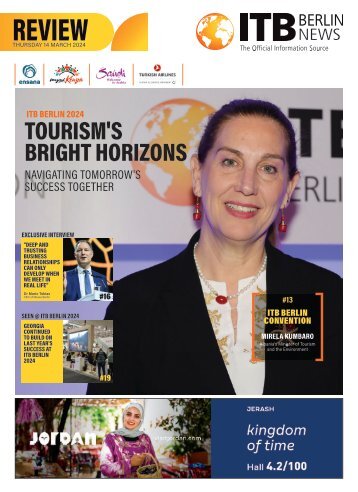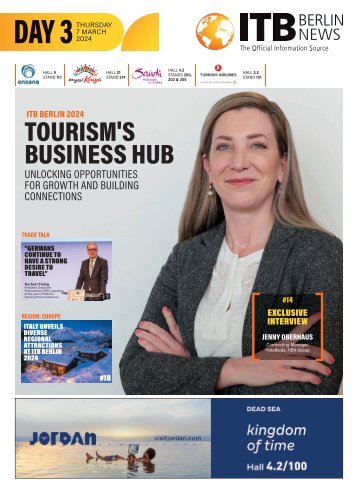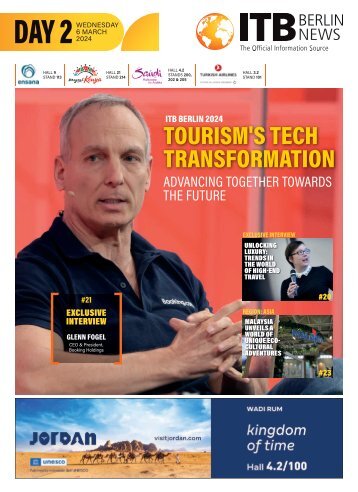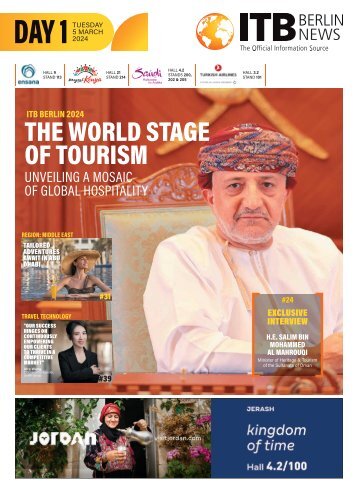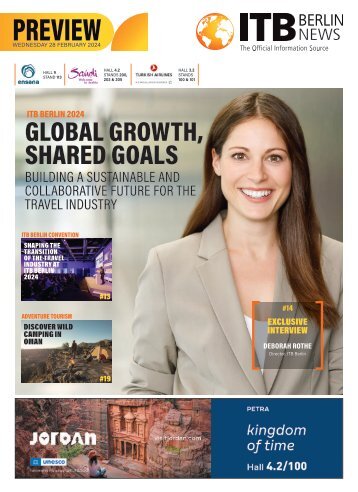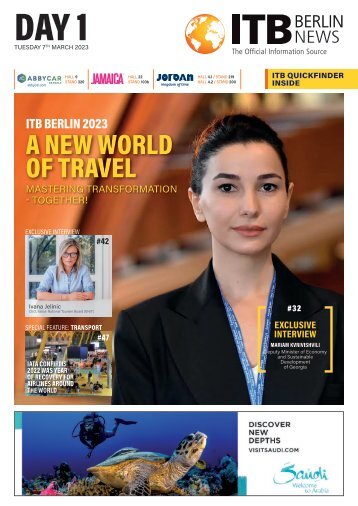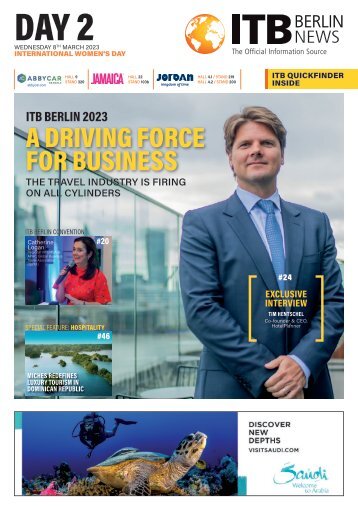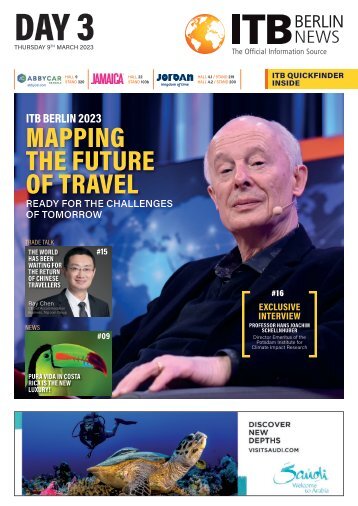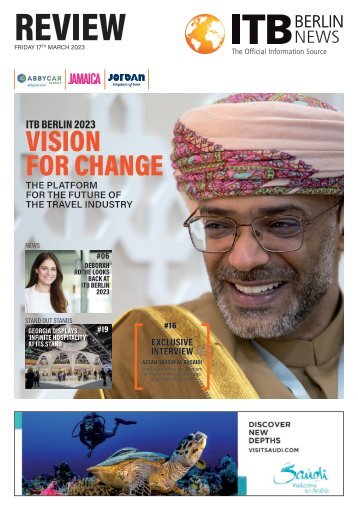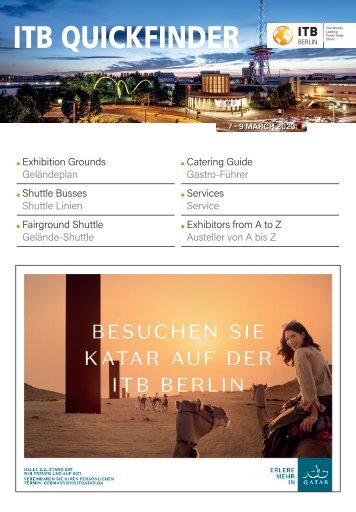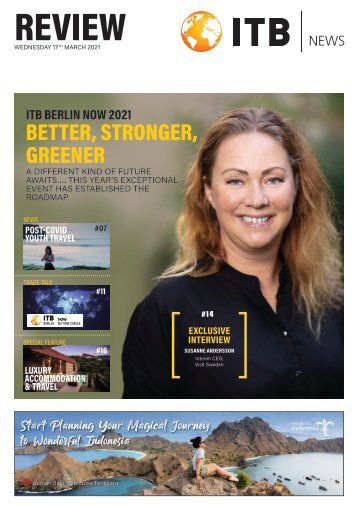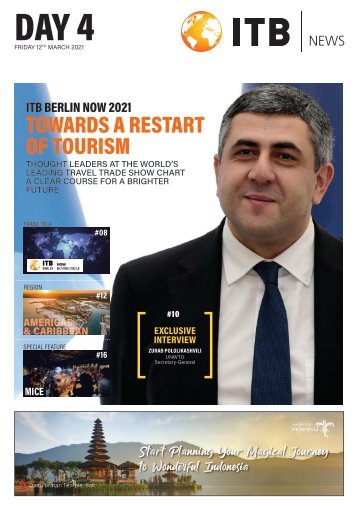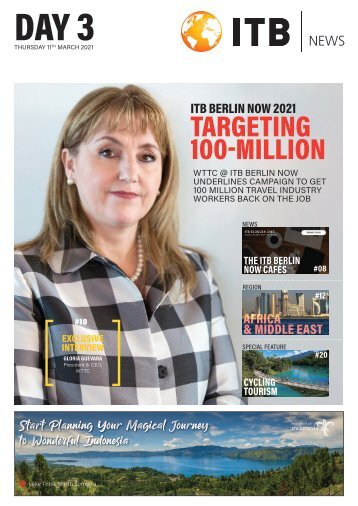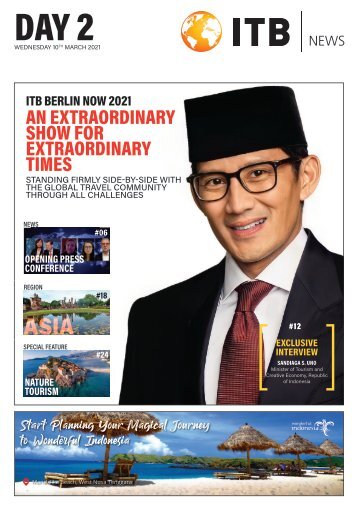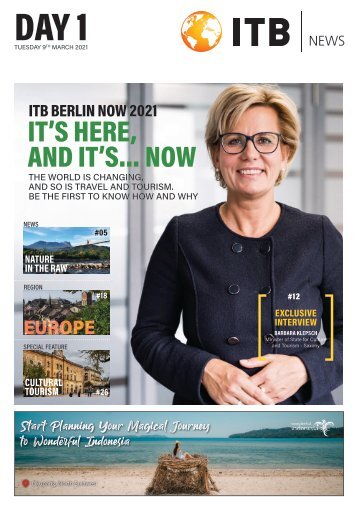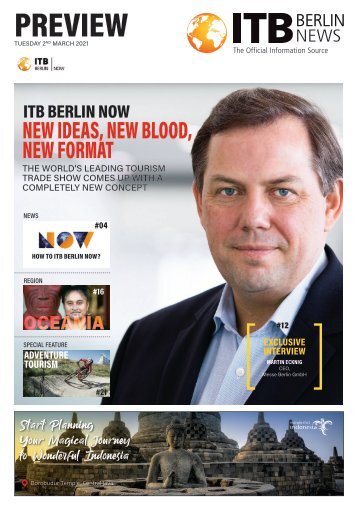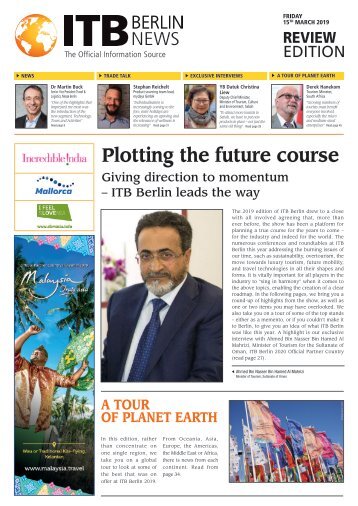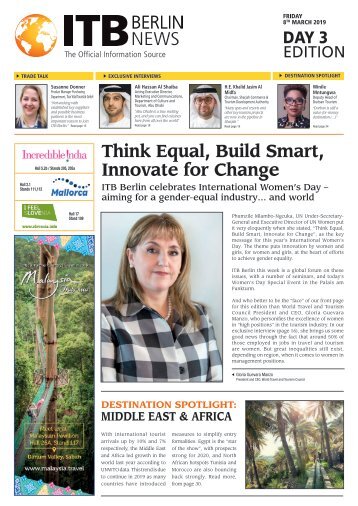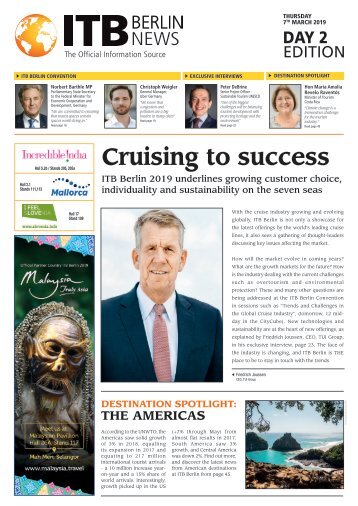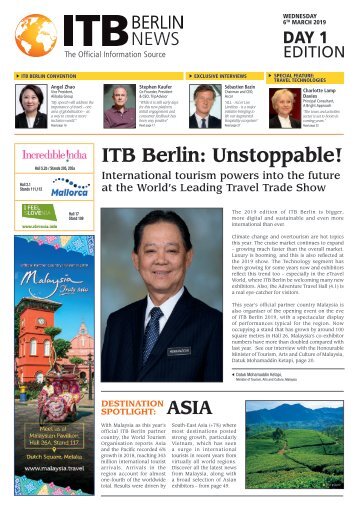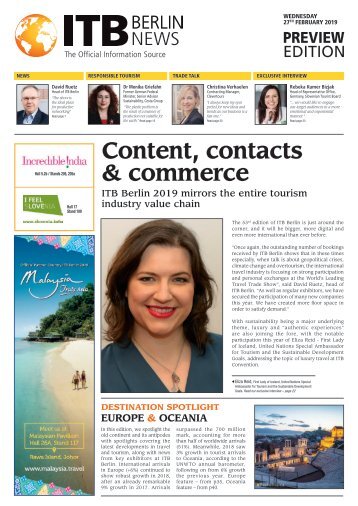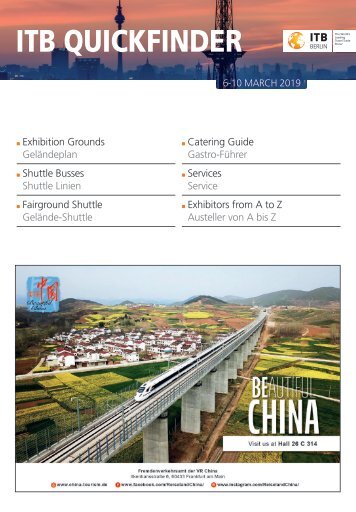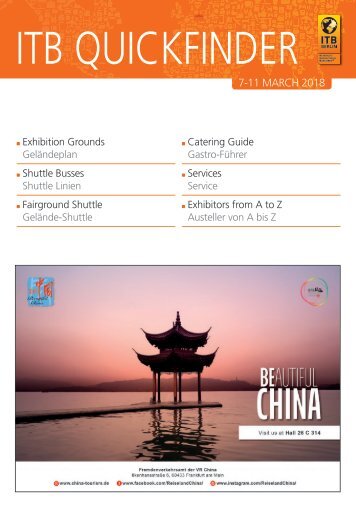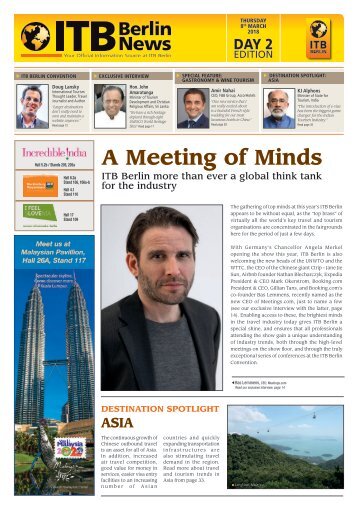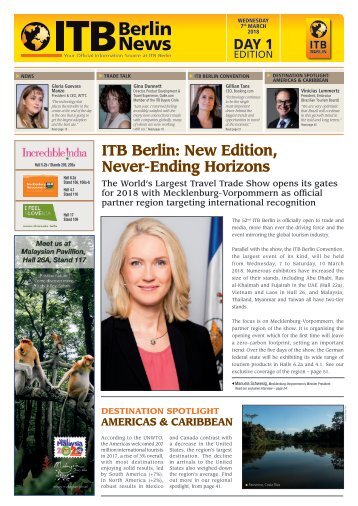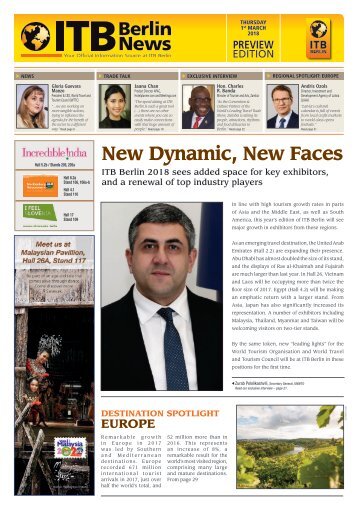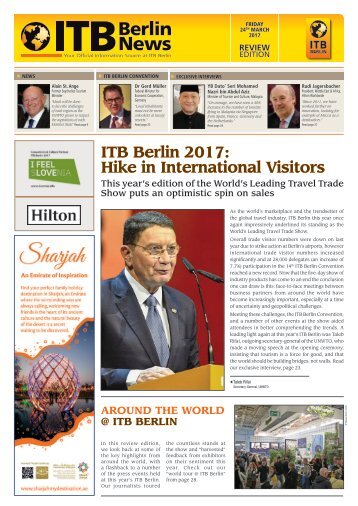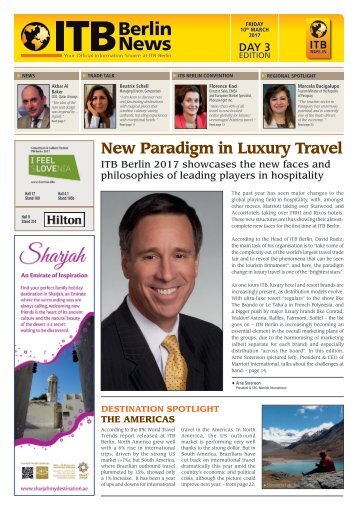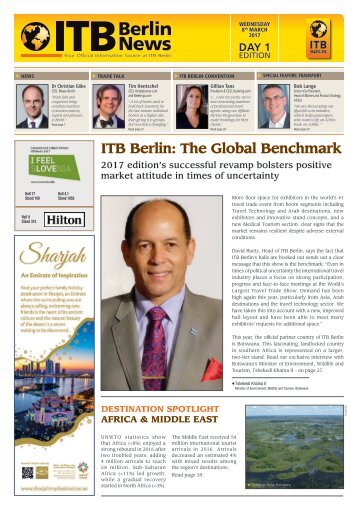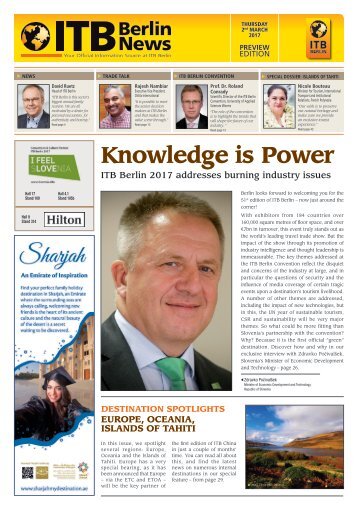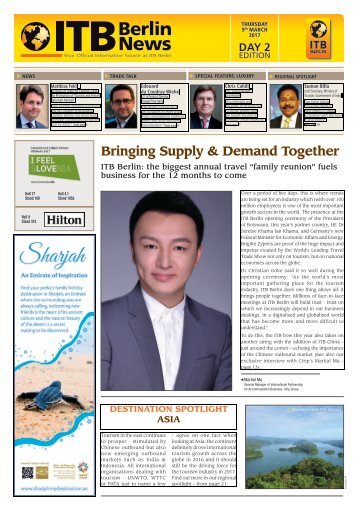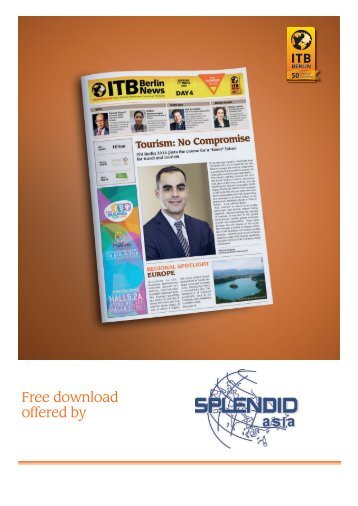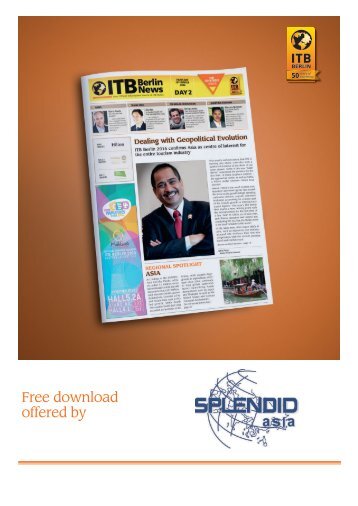
ITB Berlin News - Review Edition
- Text
- Berlin
- Tourism
- Global
- Unwto
- Sustainable
- Airlines
- Destinations
- Germany
- Travellers
- Hotels
22 ITB
22 ITB BERLIN CONVENTION Minister Müller Appeals to Tourism Professionals’ Conscience at ITB Berlin Keynote Maximilian Waldmann CEO & Founder, Conichi Self-Employment In The Travel Industry: Lifetime Dreams, Pitfalls, Tips Why always a large corporation or tourist office? Selfemployment and start-ups are often more exciting and fulfilling alternatives. But big opportunities also mean big risks. At this year’s ITB Berlin Convention, Maximilian Waldmann, CEO & Founder, Conichi looked at why most business concepts fail, and how one can successfully fulfill one’s lifelong dream. We asked him to tell us a little more about how the employment market is evolving in the tourism and hospitality industries In our space, we are actively searching for driven and passionate individuals who have expertise in both the hospitality and simultaneously have digital minds. The complexity we have to break through is bring our technology layer into the hotels and their SOPs - it’s always easier if you’ve been on both sides of the table. With our customers, we are observing the trend that they are continuously hiring younger techsavvy employees who can spearhead their digital transformation. You talk about “big opportunities - big risks” … do you have some examples? I believe that there is no better time than now to setup a business and especially one in the hospitality space as the market continuously opens up. Everyone has the chance to define and steer an entire industry, shaping this for the good. Of course, there are risks of failing, but what does failing really mean? Either you do it again and better, you do something else or you go back to your old job. Really there is no risk - only opportunity costs. Many people believe the holy grail to building a successful start-up is a good idea, hence they protected this up to the last second. Truth is, anyone can have an idea to setup a pizzeria, but the question is who bakes the best and who sells the most pizzas? So being a sunshine entrepreneur and having a great idea is one thing - executing it 12 hours every day is a different one In a stirring keynote at ITB Berlin, Germany’s Federal Minister for Economic Cooperation Dr Gerd Müller appealed to the tourism industry to actively address the lack of sustainable tourism. “This luxury sector must be capable of getting to grips with the issue”, the CSU member said in his keynote speech at the ITB Berlin Convention. Müller confronted his audience with three demands: Tourism had to conserve and protect while offering benefits, it had to ensure fair employment and it had to do more to protect the environment. To underline his first demand, he cited the example of Botswana, the partner country of ITB Berlin. The country had been able to stabilise safari tourism by enforcing a general hunting ban and declaring over 40% of its land surface as a nature reserve. Germany made a huge contribution, he added, by annually providing 1.2 million euros to support the Kavango Zambezi Transfrontier Conservation Area, which covered an area greater than Sweden and crossed into five different countries in southern Africa. Illustrating his second demand, he said, “Local inhabitants must not be mere onlookers at luxury resorts.” Providing there was a committed effort to sustainable tourism, local inhabitants could be part of the concept, and they would consequently understand the benefits of tourism. He however criticised certain aspects of the cruise industry, stating that with around 550 large cruise liners on the world’s oceans, they often ran on heavy fuel that pumped 3,500 times more sulphur into the environment than road vehicles on normal diesel. He also talked about insufficient efforts to recycle plastic bottles. If this continued for a few more years, the oceans would “soon contain more bottles than ships.” He did not deny the fact that in certain sectors, efforts were being made to promote ecotourism. However, sustainable tourism had to become a global strategy, the minister said. One could start on one’s own doorstep. In Germany, barely 5% of tourist accommodation had acquired sustainable tourism certification Dr Gerd Müller Germany’s Federal Minister for Economic Cooperation ITB BERLIN NEWS • Friday 24 th March 2017 www.itb-berlin-news.com
EXCLUSIVE INTERVIEW 23 The Traces of a Guiding Light UNWTO Secretary General Taleb Rifai attends his last ITB Berlin in this position – exclusive interview After 18 years as a faithful ITB Berlin participant, UNWTO Secretary-General Taleb Rifai participated for the last time in this position at this year’s show. At the official launch ceremony, he stated that he shall miss this show, and all the people here, very much. This is Taleb Rifai’s final year as UNWTO Secretary-General, a position he has held for almost seven years. In that time, the Secretary General has been a champion for tourism as a vector for peace and understanding, a force for good, and particularly this year, a force for sustainable development. Arriving at ITB Berlin 2017, we asked him what he sees as being the most important factors affecting the global tourism market today… Taleb Rifai UNWTO Secretary General At UNWTO we have three major priority areas that coincide with the concerns that the sector faces: technology and its impact in tourism, safe, secure and seamless travel and sustainable tourism. This latter receives a particular attention as we are celebrating the International Year of Sustainable Tourism in 2017, a unique opportunity to advance towards a more responsible sector. You have often spoken in the past about the importance of opening borders. The world seems to be taking a different direction today. How do you feel about that? Building walls will lead us nowhere. We have witnessed a great development of new technologies and security measures and these should be put at the service of all of us so that we travel in a more secure, easy and fast manner. At UNWTO we advocate the role of tourism in bridging us all and in promoting intercultural exchanges, so needed in current times. Moreover, closing borders will have negative impacts first and foremost on those opting for isolationism. At ITB Berlin you have a number of activities, not the least of which is the Silk Road Ministers’ I AM PROUD TO HAVE HEADED A PROJECT THAT HAS ENHANCED THE ROLE OF TOURISM AND THAT HAS POSITIONED THE SECTOR AT THE CORE OF THE AGENDA 2030 AND THE SUSTAINABLE DEVELOPMENT GOALS Meeting. How is the Silk Road project impacting tour operators today and what does the future hold? The Silk Road is not a recently created invention. It is a cultural, economic and social Route that has existed for centuries, linking peoples from different backgrounds. It is currently very alive because all humans are seeking for the values that this Route promotes. Our Silk Road Tourism Programme is very strong and is working with 33 countries to advance issues of visa facilitation, product development and marketing of the Silk Road. What are the stakes of this year’s meetings? We have a varied agenda with many topics of interest, but the International Year of Sustainable Tourism for Development will lead the debates as this is a unique opportunity that will pave the development of the tourism sector in the years to come. This is your last year as Secretary- General of the UNWTO. What do you hope to have left as a legacy, and what is your vision for the future of this industry? I am proud to have headed a project that has enhanced the role of tourism and that has positioned the sector at the core of the Agenda 2030 and the Sustainable Development Goals. This is actually what UNWTO had in its objectives for the last decades but we had to advocate the relevance of tourism in current economies in order to get the overwhelming response that we are getting during this International Year Taleb Rifai (born in Jordan in 1949) is the current Secretary-General of the United Nations World Tourism Organisation, based in Madrid, where he has held the post since being unanimously elected in 2010. Rifai served as the Deputy Secretary-General of the organization from February 2006 to February 2009, at which point he took on the role of Secretary- General ad interim on 1 March 2009. © UNWTO ITB BERLIN NEWS • Friday 24 th March 2017
- Page 1: FRIDAY 24 TH MARCH 2017 REVIEW EDIT
- Page 4 and 5: 4 NEWS © Messe Berlin GmbH ITB Ber
- Page 6 and 7: 6 NEWS The Year That Was - And The
- Page 8 and 9: 8 NEWS 6 th UNWTO Silk Road Tour Op
- Page 10 and 11: 10 NEWS (L-R): Neil Glenn, General
- Page 12 and 13: 12 NEWS Marriott: New Roadmap Annou
- Page 15 and 16: NEWS 15 Best Medical Tourism Destin
- Page 17: NEWS 17 Tom Alderink Director LGBT
- Page 20 and 21: 20 TRADE TALK Better People, Better
- Page 24 and 25: 24 EXCLUSIVE INTERVIEW YB Dato’ S
- Page 26 and 27: 26 EXCLUSIVE INTERVIEW 5 Pillars to
- Page 28 and 29: 28 AROUND THE WORLD @ ITB BERLIN Sl
- Page 30 and 31: 30 AROUND THE WORLD @ ITB BERLIN Ky
- Page 32 and 33: 32 AROUND THE WORLD @ ITB BERLIN In
- Page 34 and 35: 34 SPOTLIGHT ON GERMAN REGIONS Metz
- Page 36: 36 WHERE TO GO IN Berlin Cultural E
Inappropriate
Loading...
Mail this publication
Loading...
Embed
Loading...
